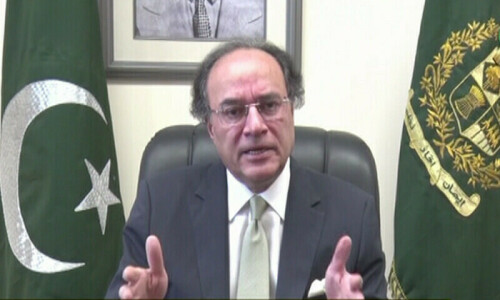Rising tax rates have left the public in distress while the government continues to lament the low tax-to-GDP ratio. There isn’t sufficient revenue to cover government expenditures and debt repayments, including interest. Last year, the overall budget deficit was estimated at Rs6.9 trillion, which was 7.4 per cent of GDP.
To reduce this deficit and increase revenue, the government is imposing more taxes on one hand and cutting subsidies — especially in the electricity and gas sectors — on the other, as part of its commitments to the International Monetary Fund.
The recent Economic Survey for 2023-24 reveals that while tax rates have increased, spending on public welfare and subsidies has decreased, leading to a further decline in the standard of living. The survey references a report by the Food and Agriculture Organisation indicating that an average Pakistani family needs at least Rs53,000 per month to afford a nutritious diet — a figure beyond the reach of approximately 82pc of Pakistani families.
Ideally, the government should have imposed taxes on sectors outside the tax net or brought tax evaders into the fold. Instead, the burden has increased on those already paying their part. This approach has disproportionately impacted the middle class, particularly salaried individuals.
Encouraging investment leads to higher employment levels and thus higher tax revenues
In this fragile situation, the pressing question arises: Can any country develop with a low tax-to-GDP ratio (which has averaged between 8pc and 9pc over the past five years)? Can public services like healthcare, education, and other necessities be provided at such low rates? Is increasing government revenue through higher taxes the only solution?
To understand this, we don’t need to look far. In neighbouring China, the tax-to-GDP ratio was 7.96pc in 2021, which further decreased to 7.7pc in 2022. Meanwhile, in the same years, Pakistan’s ratio was 8.5pc and 9.2pc, respectively. Despite this low tax-to-GDP ratio, China is not only a rapidly developing country but also among the world’s most populous nations.
The investment in Pakistan as a percentage of GDP is only 14pc — a rate that is not only declining but also lower than that of other countries in the region
China has expanded public facilities and made health insurance more accessible in recent years. As a result, nearly 800 million people have risen above the poverty line. The key is that China focused on increasing national income and encouraging investment, leading to higher employment and income levels. Consequently, despite low tax rates, government revenue increased.
However, if we examine the investment situation in our own country, it’s evident that investment as a percentage of GDP is only 14pc. This rate is not only declining but also lower than that of other countries in the region. This is insufficient to sustain future economic growth. Lower investment means lower income and tax revenue, which could lead to even more taxes in the future.
The solution? We must seriously address the factors hindering investment in the country. To halt the decline in investment, it’s essential to create conditions that facilitate investors. Currently, Pakistan ranks 108th in the Ease of Doing Business Index for 2019, while India ranks 63rd and China 31st.
Similarly, in the World Bank’s Governance Indicators percentile rankings (where a higher number indicates worse performance), Pakistan was ranked 165th in corruption control, while India and China were ranked 119th and 96th, respectively, in 2022.
In terms of government effectiveness, which assesses the quality of government institutions and bureaucracy, Pakistan also lags behind India and China, ranking 151st, compared to India at 79th and China at 68th.
In terms of political stability and the absence of violence, Pakistan ranks 199th out of 213 countries. Finally, in the rule of law percentile rankings, Pakistan again trails behind India and China, ranking 160th, while India ranks 69th and China 101st.
These indicators highlight the urgency of resolving these issues to increase business opportunities in the country. This would raise incomes, which not only helps improve the standard of living for the public but also enables the government to collect more tax revenue without increasing tax rates.
The writer is an Assistant Professor at The Applied Economics Research Centre (AERC), University of Karachi
Published in Dawn, The Business and Finance Weekly, September 16th, 2024















































